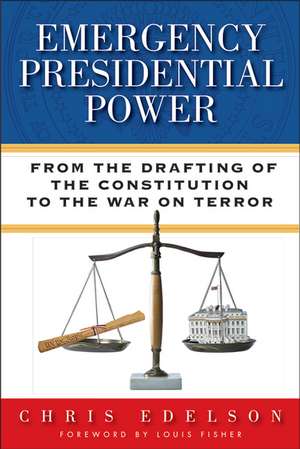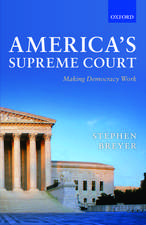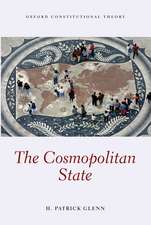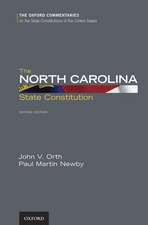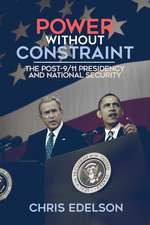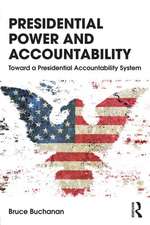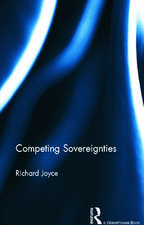Emergency Presidential Power: From the Drafting of the Constitution to the War on Terror
Autor Chris Edelson Cuvânt înainte de Louis Fisheren Limba Engleză Hardback – 18 dec 2013
Can a U.S. president decide to hold suspected terrorists indefinitely without charges or secretly monitor telephone conversations and e-mails without a warrant in the interest of national security? Was the George W. Bush administration justified in authorizing waterboarding? Was President Obama justified in ordering the killing, without trial or hearing, of a U.S. citizen suspected of terrorist activity? Defining the scope and limits of emergency presidential power might seem easy—just turn to Article II of the Constitution. But as Chris Edelson shows, the reality is complicated. In times of crisis, presidents have frequently staked out claims to broad national security power. Ultimately it is up to the Congress, the courts, and the people to decide whether presidents are acting appropriately or have gone too far.
Drawing on excerpts from the U.S. Constitution, Supreme Court opinions, Department of Justice memos, and other primary documents, Edelson weighs the various arguments that presidents have used to justify the expansive use of executive power in times of crisis. Emergency Presidential Power uses the historical record to evaluate and analyze presidential actions before and after the terrorist attacks of September 11, 2001. The choices of the twenty-first century, Edelson concludes, have pushed the boundaries of emergency presidential power in ways that may provide dangerous precedents for current and future commanders-in-chief.
Winner, Crader Family Book Prize in American Values, Department of History and Crader Family Endowment for American Values, Southeast Missouri State University
Winner, Crader Family Book Prize in American Values, Department of History and Crader Family Endowment for American Values, Southeast Missouri State University
Preț: 186.24 lei
Nou
Puncte Express: 279
Preț estimativ în valută:
35.64€ • 38.70$ • 29.94£
35.64€ • 38.70$ • 29.94£
Carte tipărită la comandă
Livrare economică 22 aprilie-06 mai
Preluare comenzi: 021 569.72.76
Specificații
ISBN-13: 9780299295301
ISBN-10: 0299295303
Pagini: 376
Dimensiuni: 152 x 229 x 36 mm
Greutate: 0.64 kg
Ediția:1
Editura: University of Wisconsin Press
Colecția University of Wisconsin Press
ISBN-10: 0299295303
Pagini: 376
Dimensiuni: 152 x 229 x 36 mm
Greutate: 0.64 kg
Ediția:1
Editura: University of Wisconsin Press
Colecția University of Wisconsin Press
Recenzii
"Chris Edelson has successfully tackled a big and controversial topic with skill and grace. His balanced, fair-minded work is a welcome addition to a literature on presidential power in times of crisis that is often captured by partisans with a cause."—Michael Genovese, author of Presidential Prerogative
“Edelson . . . lays down a foundation from which the current debate about the powers of the presidency can be more clearly understood.”—Kirkus Reviews
Notă biografică
Chris Edelson is assistant professor of government at American University's School of Public Affairs. He practiced law in the District of Columbia and New York and served as state legislative director for the Human Rights Campaign in Washington, D.C.
Extras
“Crisp writing and solid analysis. Edelson covers military tribunals, detention, the unitary executive theory, warrantless surveillance, torture, and the state secrets privilege, concluding with President Obama's military intervention in Libya. He explains how claims for inherent and unchecked executive power endanger individual rights and constitutional liberties.”—from the foreword by Louis Fisher
Cuprins
Acknowledgments
Introduction
1 The Constitution and Emergency Presidential Power
2 Presidential Power in the Young Republic: Washington's Neutrality Proclamation, a "Half-War" with France, and the Alien and Sedition Acts
3 Lincoln and the Wartime Constitution
4 Setting Limits on Wartime Power? The Ex Parte Milligan Decision
5 Expanded Presidential Power during World War II: Nazi Saboteurs and Military Commissions
6 The Internment of Japanese Americans during World War II
7 The Youngstown Steel Seizure Case: The Court Sets Limits on Presidential Power
8 Nixon, Watergate, and a Bid for Unbridled Presidential Power
9 Emergency Presidential Power at Its Zenith: The Bush Administration and the Unitary Executive
10 Detaining and Trying Suspected Terrorists
11 Torture in the War on Terror
12 Warrantless Wiretapping: Presidential Power to Set Aside Acts of Congress?
13 Detention and Military Commissions under the Obama Administration
14 The State Secrets Privilege: Emergency Presidential Power by Another Name?
15 The Obama Administration and Military Action in Libya
Notes
IndexDescriere
Can a U.S. president decide to hold suspected terrorists indefinitely without charges or secretly monitor telephone conversations and e-mails without a warrant in the interest of national security? Was the George W. Bush administration justified in authorizing waterboarding? Was President Obama justified in ordering the killing, without trial or hearing, of a U.S. citizen suspected of terrorist activity? Defining the scope and limits of emergency presidential power might seem easy—just turn to Article II of the Constitution. But as Chris Edelson shows, the reality is complicated. In times of crisis, presidents have frequently staked out claims to broad national security power. Ultimately it is up to the Congress, the courts, and the people to decide whether presidents are acting appropriately or have gone too far.
Drawing on excerpts from the U.S. Constitution, Supreme Court opinions, Department of Justice memos, and other primary documents, Edelson weighs the various arguments that presidents have used to justify the expansive use of executive power in times of crisis. Emergency Presidential Power uses the historical record to evaluate and analyze presidential actions before and after the terrorist attacks of September 11, 2001. The choices of the twenty-first century, Edelson concludes, have pushed the boundaries of emergency presidential power in ways that may provide dangerous precedents for current and future commanders-in-chief.
